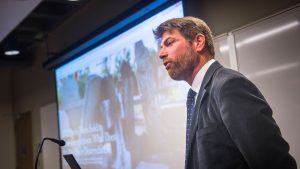Over the past four years, the slavery archive has grown to more than 400 items, including not just archival material from Georgetown’s Booth Family Center for Special Collections, but from the Maryland State Archives, the National Archives and other repositories. Several items have been contributed by descendants of the 272 individuals enslaved by the Maryland Jesuits.
Historical sources do not just appear on the internet. The Georgetown Slavery Archive’s team of researchers has worked hard to find relevant sources, transcribe and translate them accurately, and provide the historical context needed to understand them.
 While many universities are now studying their historical ties to slavery, the Georgetown Slavery Archive stands out as one of the most extensive and accessible digital repository of archival material documenting any school’s history. It also provides an unmatched window into the entanglement of religion and slavery, as it reveals the 150-year history of slaveholding by the Maryland Jesuits.
While many universities are now studying their historical ties to slavery, the Georgetown Slavery Archive stands out as one of the most extensive and accessible digital repository of archival material documenting any school’s history. It also provides an unmatched window into the entanglement of religion and slavery, as it reveals the 150-year history of slaveholding by the Maryland Jesuits.
The Georgetown Slavery Archive has been widely used by Georgetown faculty and students in a variety of classes, and the archive includes creative work by students, including podcasts and video that interpret and explain the archival materials. We are now branching out into scholarly publishing, developing lesson plans and teachers’ workshops, doing oral histories and building greater awareness of the incredible resources that are now available for people to learn about the history of slavery and its legacies.
